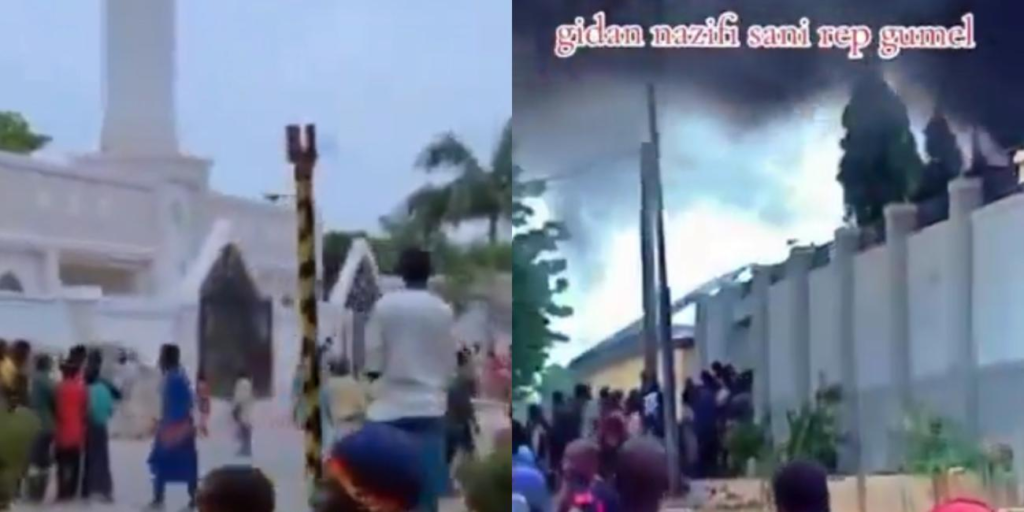
Some irate youths in northern Nigeria have begun to attack properties owned by political leaders amid the ongoing nationwide protests against hardships and bad governance in the country.
In videos posted on X on Tuesday, some youths were seen burning a mansion reportedly built by a serving House of Representatives member, Nazifi Sani Gumel, representing Gumel/Maigatari/Sule Tankarkar/Gagarawa Federal Constituency.
The youths accused the lawmaker of neglecting their constituency after his election 14 months ago during the last general elections.
In a similar incident that happened in Yobe State, another set of angry youth attacked a current serving Senator’s House for allegedly siphoning public funds meant for the development of his district.
The #EndBadGovernance protests in northern Nigeria, particularly in Kaduna, Kano, Zamfara, and other areas, have taken a surprising turn with protesters waving Russian flags. These individuals have expressed discontent with the Nigerian government’s adoption of IMF policies and the Western-style democracy, leading them to seek support from Russia and advocate for an alternative system.
There have been reports of looting and vandalisation of properties by some persons said to be protest hijackers.
A newly constructed office of the Nigerian Communications Commission (NCC) Industrial Park was attacked last week in Kano State.
President Bola Tinubu’s administration had also revealed that there were about 150 new computers and laptops inside the looted facility.
Speaking on the incident when he appeared on Channels TV on Thursday night, the Minister of Digital Economy, Bosun Tijani, said the facility was completely vandalised by the miscreants.
He said, “I think from the top of my head here, I think we would have between 120 and 150 computers, both PCs and laptops in there. In fact, what was missing was the generator needed, a few more works and also the power backup that needed to be in the space before we could start using the computers.
“That was the last thing the contractor supplied and we meant to do put it in use. But this is part of what you get with protest.
“The last report I got was actually from an aide to the governor who is the gentleman that we have been working with on the official launch next week. And he had to reach out and say they may need more security officers to help.”
Millions of Nigerians took to the streets on Thursday, 1 August, to protest the prevailing hunger and abuse of power in the country.
Demonstrations continued on Friday, Saturday, Sunday and Monday in Lagos, Ogun, Abuja, Oyo, Ogun, Rivers and other states.
Dozens of people have been killed across Nigeria since the #EndBadGovernance protest commenced. At least 13 people were shot dead by security operatives across the country on the first day.
Police dismissed the information.
Amnesty International asked the government to probe the killings and “highhandedness” of security operatives.
On Friday, 2 August, the Nigerian military asked both international and local media to stop covering nationwide protests over hunger and prevailing hardship under President Bola Tinubu’s government.
The military chief, Christopher Musa had announced that the military may step in if the protest escalates.
Mr Musa’s call for a media blackout on the protests mirrors the actions taken during the EndSARS protests on October 20, 2020, when electricity was disconnected, and telecom networks were down at the Lekki Toll Gate before soldiers opened live rounds on protesters.
Both local and international media have reported developments on the protests, which have seen thousands of Nigerians take to the streets over the worsening cost of living crisis.
On Thursday, poor telecom network coverage hampered the dissemination of information as protesters marched on the streets.
The Nigerian Communication Commission (NCC) and the office of the National Security Adviser (NSA) slowed down internet speed across the country to suppress the flow of information from the protesters to other Nigerians and the outside world, according to an exclusive report by Peoples Gazette.
The network issue continued over the weekend.
Nigeria is facing its worst economic crisis in decades, with skyrocketing inflation, a national currency in free-fall and millions of people struggling to buy food. Only two years ago Africa’s biggest economy, Nigeria is projected to drop to fourth place this year.
The pain is widespread. Unions strike to protest salaries of around $20 a month. People die in stampedes, desperate for free sacks of rice. Hospitals are overrun with women wracked by spasms from calcium deficiencies.
Although President Bola Tinubu increased the minimum wage — after strike action and months-long negotiations with labour unions — from N30,000 to N70,000, his government has increased spending for officials at a time of nationwide starvation.
For workers earning the new N70,000, or $43, per month minimum wage, capricious inflation and naira value have inflicted too much damage for the changes to make any difference in their lives.
The crisis is largely believed to be rooted in two major changes implemented by Mr Tinubu, elected 14 months ago: the partial removal of fuel subsidies and the floating of the currency, which together have caused major price rises.
A nation of entrepreneurs, Nigeria’s more than 200 million citizens are skilled at managing in tough circumstances, without the services states usually provide. They generate their own electricity and source their own water. They take up arms and defend their communities when the armed forces cannot. They negotiate with armed kidnappers when family members are abducted.
But right now, their resourcefulness is being stretched to the limit.
KOIKI Media bringing the world 🌍 closer to your door step
